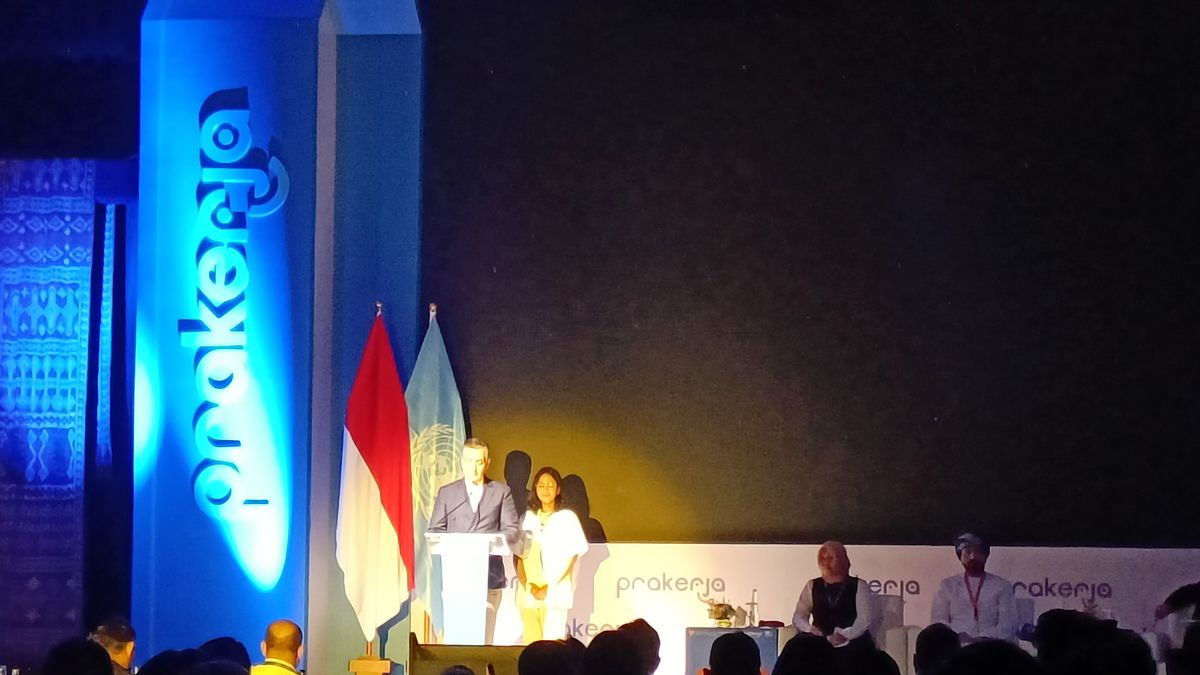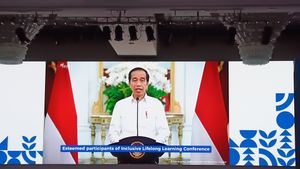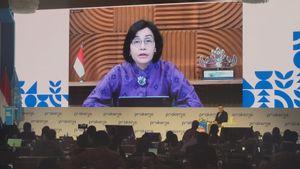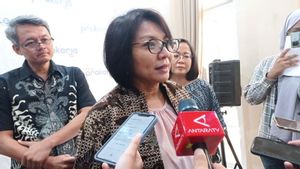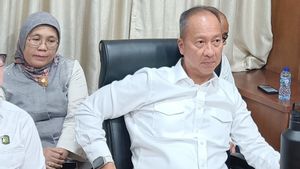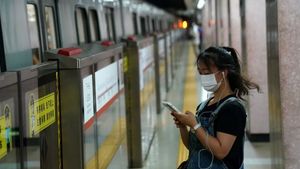BALI - Pre-Employment and Educational, Scientific and Cultural Organizations of the United Nations (UNESCO) have completed holding an Inclusive Lifelong Learning Conference (ILCC) event in the Nusa Dua area, Bali, today.
Executive Director of Pre-Employment Card Program Implementing Management Denni Purbasari said 339 participants from 38 countries had been involved in the event.
"We from Pre-Employment really wanted to limit the number of participants so that there would be truly intensive discussions," Denni said at a press conference at the ILC event in the Nusa Dua area, Bali, Wednesday, July 5.
Then, said the Director of Denni, the VVIP involved in the event were Mr. President Joko Widodo (Jokowi), Mr. Coordinating Minister for the Economy Airlangga Hartarto, Mrs. Minister of Finance Sri Mulyani, Minister of Education Equador, two deputy ministers from Venezuela and Laos, as well as 4 ambassadors for friends and parliament from Australia.
Furthermore, said Denni, this ILC conference is an acknowledgment of the successful large-scale program (Prakerja) and has shown Indonesia's leadership as Chair of ASEAN and a member of the G20.
"Through this activity, we want to share and we can inspire our brothers and sisters in the world," he said.
From a series of 3 days that has been held, namely from 3-6 July, Indonesia and all representatives of delegates from 38 countries have agreed to declare 20 joint decisions.
Here are 20 Joint Decisions on the 'Learning Throughout Life' campaign (Lifelong Learning):
1. We, the participants of the Inclusive Lifelong Learning Conference, which will be held on 3-6July 2023, in Bali, Indonesia, would like to thank the Government of Indonesia and the UNESCO Institute for Lifelong Learning as the host of this conference, which aims to:
a. Inventory the policies and national initiatives of learning throughout life.
b. Identifying good practices and innovations in inclusive learning and adult education.
c. Reflect on effective ways to translate the Marrakech Action Framework into policy and strategy steps.
2. We note that this conference lasts one year after CONFINTEA VII was held in Marrakech, Morocco, in June 2022 and 18 months since the Independent Commission of the Future of Education published a report calling for a new social contract for education. This initiative provides an impetus to Transforming Education Summit organized by the Secretary-General of the United Nations in New York in September 2022, calling for a transformation to recover from learning loss experienced during the pandemic, to drive a green and digital transition, and to ensure quality life-long education as a common public good.
In the spirit of this event, we recognize the important role of a lifetime learning ecosystem that is inclusive in changing society and realizing human rights for all.
3. We affirm our commitment to realize the United Nations Agenda's promise for Sustainable Development 2030 and achieve 17 Sustainable Development Goals (SDGs), particularly SDG 4 on inclusive and equivalent quality education, and encourage life-student learning opportunities for all.
4. We reiterate the importance of CONFINTEAVII Marrakech's Framework: exploiting the transformational power of adult learning and education (CONFINTEA VII Marrakech Framework for Action: Harnessing the transformational power of adult learning and education) and the commitments made by UNESCO Member States to recognize diversity, including language diversity, and take action towards inclusion, gender equality, accessibility, increased participation and equality among learning and education adults.
5. We reiterate the need to expand life-long learning opportunities to each individual, especially for all vulnerable groups, such as women, the elderly, ethnic minorities, indigenous communities, migrants, rural residents and people with disabilities, and we are committed to the principle of 'not leaving anyone behind'.
Challenges And Opportunities For Inclusive Life Learning:
6. We recognize the challenges associated with expanding access and equal participation for all for life learning. These include social-economic limitations, literacy gaps, educational gaps, limited access to learning opportunities due to geographical or infrastructure constraints, digital inequality, language and cultural barriers, limited access to adequate learning materials and equipment for persons with disabilities, lack of flexibility in learning choices, discrimination and prejudice, lack of guidance and information, as well as inadequate financing for adult learning and education.
7. We also recognize that the threats facing humanity, including climate change, food insecurity, war and conflict, demographic changes, increasing the number of people at risk of being ostracized from job opportunities and learning, including migrants and refugees.
8. We also recognize that the use of digital technology in education is a double-edged sword. They offer great opportunities, where inclusion is at the heart of design, resistive and adaptive technology, as well as online and hybrid learning can facilitate access to personalized learning opportunities. However, technology also poses a threat to privacy and security, as well as potentially excluding people who are not connected to the internet or who do not have the digital skills needed to engage with an increasingly digital world.
This threat is accelerated by the growth of generative artificial intelligence and other advanced technologies. Although at the same time, digital technology has the potential to revolutionize the industry, reshape the economy, and transform our society, the rapid development of technology also raises concerns about job transfer and social inequality.
Therefore, it is important to address the digital divide and build the right regulatory framework to strengthen inclusion, ensure fair access to technology and internet connectivity for all students.
9. We agree that adult learning and education is a policy opportunity to consolidate social cohesion, improve the development of cognitive, professional, and socio-emotional skills, secure peace, improve cultural understanding, improve workability, contribute to climate action, and encourage peaceful shared life.
10. We understand that marginalized groups are not homogeneous, we also agree that it is very important to identify the unique learning needs of individuals and groups, implement appropriate strategies, develop training content and learning modalities, and ensure that everyone can fully participate so that students can achieve their potential.
Realizing Inclusive Lifetime Learning
11. We call for the promotion of an inclusive lifetime learning ecosystem that can effectively meet the needs of all students, especially vulnerable and marginalized individuals and communities, by removing barriers and overcoming structural inequalities. We also call for an inclusive lifetime learning environment, which embraces diversity, in particular by supporting the learning infrastructure of community learning spaces that reach local communities.
12. To ensure equal opportunities for all students, we call for the implementation of comprehensive life-student learning policies, creation of inclusive learning spaces, and the development of undiscriminatory curriculum, learning pathways and learning materials that embrace diversity, and help ensure that each learner has the same rights and opportunities to learn.
13. We recognize that the development and implementation of inclusive education policies and programs requires adequate financial resources and institutional capacity at the national and regional levels.
Therefore, we call for increased public investment in learning throughout life to ensure the provision of quality and various learning programs that provide students for all ages with skills related to livelihoods, climate change, digital transformation, and active citizenship.
14. We are aware of the importance of an accountability and monitoring mechanism for the implementation of commitment and measuring progress towards inclusion. The data must be collected and analyzed in a sort of way to identify age, gender, geographic location, citizenship status, and other differences to inform policies and proof-based practices.
15. We call on governments, international organizations, and educational institutions to strengthen their data collection systems, cooperate with civil society organizations and the private sector, and ensure that indicators related to learning throughout life, and inclusion, are particularly integrated into the monitoring framework.
16. We call on the government to build a coherent and accountable governance mechanism that encourages inter-ministerial, cross-sectoral stakeholders and cross-sectoral partnerships to advance inclusion, led by the government with the participation of civil society organizations, the private sector, higher education institutions, and relevant stakeholders from the national level to the local level.
17. We recommend providing sustainable professional development and life-long learning opportunities for teachers and educators, establishing competency frameworks for adult educators and adequate and sustainable facilitators, as well as using an inclusive instructional approach.
Efforts must be made to improve working conditions, training, and available resources for teachers, educators, facilitators, and enable them to take advantage of digital tools as well as other instructional approaches for inclusive adult education and learning.
18. We recognize the need for sustainable professional development, career guidance, skilling, reskilling, and upskilling individuals to meet dynamic labor market demand. The mechanism for developing inclusive skills, with the active involvement of the private sector, is very important.
اقرأ أيضا:
We urge the development of programs accessible to facilitate skilling, reskilling, and upskilling, especially for women, youth and other marginalized groups with flexible learning path designs, previous learning recognition and validation, and work-based learning potentials. We believe that strengthening cross-sector partnerships can provide comprehensive support for individuals to strengthen their skills and improve their workability.
19. In this spirit, we appreciate the efforts of the Government of Indonesia to implement learning throughout life through innovative programs, such as Pre-Employment Cards, an inclusive, large-scale, and collaborative digital platform for skilling, reskilling, and upskilling students throughout their lives in Indonesia.
20. We ask UNESCO to continue to monitor the implementation of the Marrakech Action Framework through a Global Report on Adult Learning and Education (Global Report on Adult Learning and Education or GRALE) and capacity building activities through policy sharing and promising case studies from the government, civil society organizations, the private sector and other stakeholders to establish synergies at the global, regional and state levels.
The English, Chinese, Japanese, Arabic, and French versions are automatically generated by the AI. So there may still be inaccuracies in translating, please always see Indonesian as our main language. (system supported by DigitalSiber.id)
